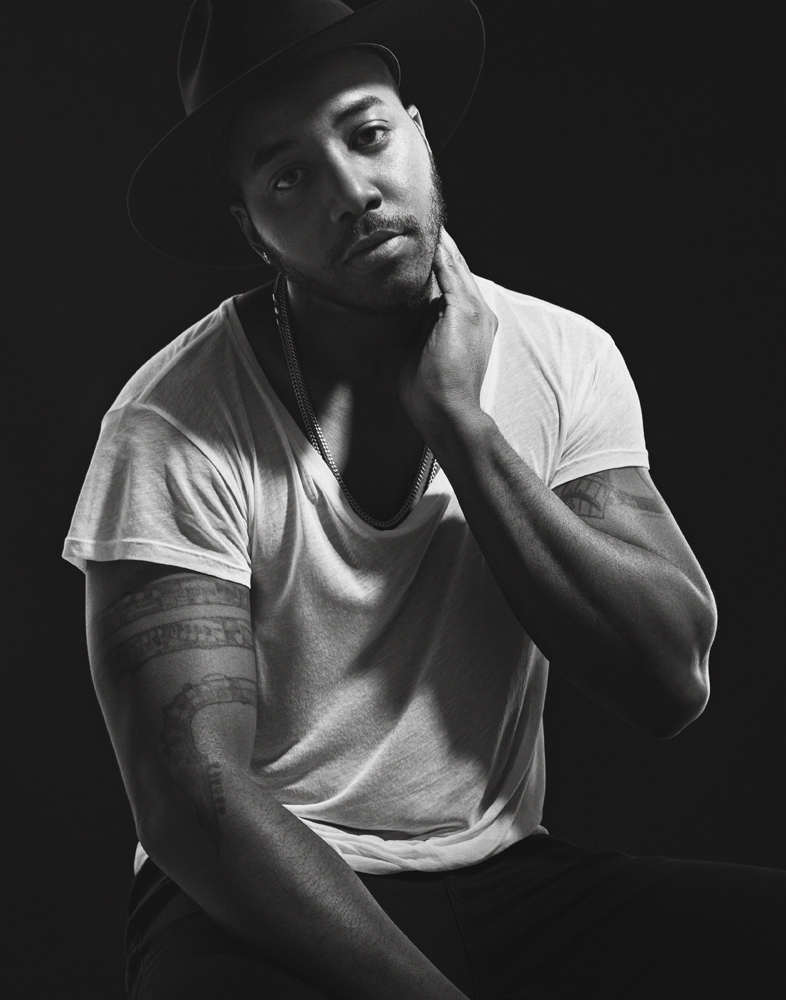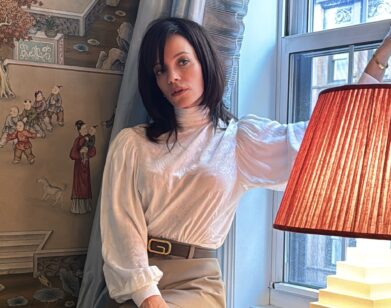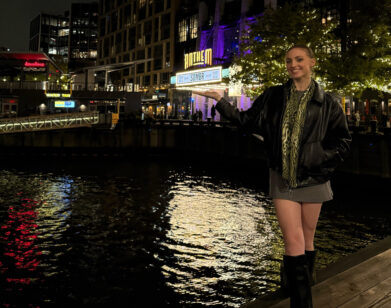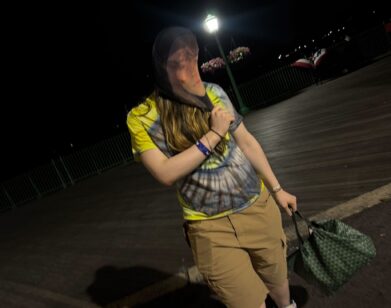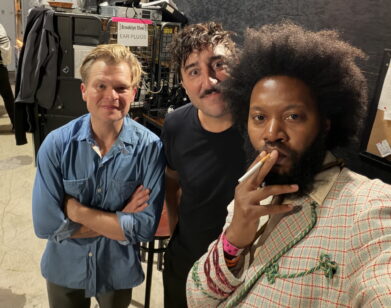The Contemporary Violinist
DAMIEN ESCOBAR/IMG IN NEW YORK, DECEMBER 2016. PHOTOS: KINYA. STYLING: NINA STERGHIOU/BRIDGE ARTISTS. GROOMING: LAURA DE LEON FOR CHANEL/JOE MANAGEMENT.
Since the age of 10—when he became the youngest person admitted to Juilliard—violinist Damien Escobar has been defying the odds. Fusing his classical training with the hip-hop he discovered in his neighborhood of South Jamaica, Queens, Escobar began his career performing on the New York subway with his brother Tourie under the name Nuttin’ But Stringz. After some early television exposure, in 2008 the sibling duo went on in to become finalists on America’s Got Talent, gaining national recognition and pioneering a seemingly improbable classical/contemporary crossover. “It’s always difficult being the first,” says Escobar. “All we heard was, ‘No, no, no. Can’t work. Won’t work.’ But we stayed consistent. We pushed back the word impossible, and it worked out.”
With a résumé that now includes two Emmys and performing at the 2012 Presidential Inauguration, it would seem that post-America’s Got Talent Escobar has had a straight-shot to success. Yet only four years ago, Nuttin’ But Stringz disbanded and the musician found himself broke, homeless, and out of love with the instrument that had accompanied him since childhood. “I spent all my money,” he reveals. “I lived on the water in Williamsburg in a multimillion dollar condo; in seven months it went into foreclosure, and I was sleeping on the L train.” However, it didn’t take long for him to find his footing again—even without a label: “I picked my violin back up, I did one show, and I realized that people like me, just by myself. That was all I needed. I was like, ‘I can do anything. Let’s do the inauguration.'” The unexpected success of Sensual Melodies—a mixtape he recorded in his mother’s basement—followed in 2014.
Today, Escobar is in the midst of a nationwide tour and looking forward to the release of his album Boundless in early 2017. “I’m fortunate to be given another opportunity,” he says, reflecting on the time when it all seemed to be over. “That was the worst time in my life, but the best time in my life. I was a baby again. I had to learn how to walk, how to appreciate, how to love. … Right now is a really great time to be alive.”
We recently sat down with Escobar ahead of his concert at the PlayStation Theater in New York City.
FRANK CHLUMSKY: Is this your first nationwide tour?
DAMIEN ESCOBAR: Yeah, my first solo tour. We’re done at the end of January, thank god. It’s fucking exhausting. But I love it, man. It’s been an incredible experience. It’s one thing to create videos and have people love them, to get a million views online. It’s another to get out in front of the people and give them the music and see how they feel about your music. It’s priceless.
CHLUMSKY: What’s the audience composition like? Are you seeing a lot of young people who might normally be interested only in hip-hop?
ESCOBAR: It really depends on the city. But on average, it’s three generations of women. It’s so trippy: it’s like, a mom who’s 60 will bring her daughter who’s 20. It’s crazy—they’re all just locked in. And it’s so dope, man, they say to me all the time, “You gave me something to have in common with my daughter.” There’s something for everyone. And if you don’t connect to the music—which, gratefully, I haven’t had that yet—you connect with the message. There’s a message in my music and that’s what I bring on stage with it. So they connect with something.
CHLUMSKY: At what age did you start playing violin?
ESCOBAR: Eight. I fell in love with it when I was six, though. It was a required elementary school program. By the time I was 10 I got so dope so quick that my teacher said, “Audition for Juilliard.” I had no idea what Juilliard was. I was like “Okay!” So I auditioned and I got accepted. I graduated with my degree in music at 13, which is pretty fucking crazy.
CHLUMSKY: So where do you go from there at 13 years old with a degree?
ESCOBAR: I was still in regular school. I was just in college for music, but I still had to do regular shit. To be honest with you, by the time I was done with Juilliard I was burnt out. I was a young kid and it was a lot really soon. I went to another school and after that I was done. I went to high school and I started fucking up, and I quit playing violin for many, many years until I found my way back.
CHLUMSKY: Your brother had been playing it before you, right? When was it that you first realized you were good at violin?
ESCOBAR: Yeah, he did it first. And he’s older by two years, so that’s why I say I fell in love at six, because I had to wait until I was eight. Let’s be clear: they say it takes 10,000 hours to become good at something. I put my 10,000 hours in in like a year—I used to come home and practice for eight hours, every single day. I had an obsession. It only took me about a year and I was playing Beethoven. That’s why my teacher was like, “What the fuck. Go audition.” It took me about a year to get really good, but it took me 22 to find my voice with the instrument.
CHLUMSKY: Who are some composers that you really connected with earlier on?
ESCOBAR: Tons. Vivaldi’s “Four Seasons”—the Winter movement. “Concerto in A Minor” by Vivaldi I love. I love Bach’s “Double Concerto.” Classical music was my first hip-hop. I grew up in South Jamaica Queens, but I had never listened to hip-hop, I only listened to classical music. And I remember the first hip-hop record that kind of turned my life out: I was walking down the street, and there’s a car going by and there’s a dude that was barking. And I’m like, “What the fuck is that?” And it was DMX. [laughs]
CHLUMSKY: That must be kind of jarring, going straight from Vivaldi to DMX.
ESCOBAR: It was a culture shift. The neighborhood that I’m from, South Jamaica Queens, is hip-hop. But I just grew up in a household where there wasn’t hip-hop; there was like Lite FM and stuff like that, but not any hip-hop. So when I heard it for the first time I was like, “Yo.” DMX—who’s my favorite rapper—is exactly like classical music. Classical music is a reflection of a story through melody. DMX does the same thing but through hip-hop. I was like, “Oh, shit, I love this dude.”
CHLUMSKY: Was there a point where you were thinking you were just going to pursue being a classical musician?
ESCOBAR: I hated classical. I haven’t played classical since I was 15. I didn’t pick up my violin with the intention to play classical forever, because classical music is so closed-minded—it’s a small market. I remember my teacher telling me that. She said, “You can’t play that way. Bach wouldn’t like that.” I’m like, “Bach’s been dead for like 400 years, for one. Two, in the 1600s Bach was an innovator. He’d be doing the same shit that I’m doing now. I am Bach.” And she was like, “No! I can’t take you!” And that was it. I call what I do an accident on purpose. It’s the culture, it’s where I’m from; I started playing music so young, I was a sponge. When I started writing music that’s just what came out. I loved hip-hop, I loved music that told stories and had movement with it; I just wanted to add my violin to it. It just worked out.
CHLUMSKY: How did you start out fusing these genres professionally?
ESCOBAR: My brother and I used to play the violin on subways—that’s how we earned our living. I only played classical on the subway, and I took the C train line. That was the Upper West Side, and they only wanted to hear classical music. My brother took the A train to Brooklyn, to Bed-Stuy, and he played hip-hop. So the way that everything kind of came together was that he had a concert—and he and I weren’t playing together at that point—and he was too nervous to get on stage by himself. I’m like, “Dude, I don’t play hip-hop, I can’t get on stage with you.” He said, “Look, you just do some classical shit. I’ll play some hip hop.” And that’s how everything happened. That was it. We were like, “Oh, shit! People like it!”
CHLUMSKY: When did you and your brother part ways?
ESCOBAR: We parted ways professionally in 2012. At that time there was a lot of friction. A lot of things happen in groups. You make a shit ton of money—I had quite a few million in my bank account at that time. When you start looking at the instrument as a commodity, and not as something that’s therapeutic—not only for you, but for other people—it becomes about, “How much money can we make with this instrument?” Me, personally, I was extremely depressed. I had a lot of money, but I was depressed. Everything came crashing down. I like to say that I made a permanent decision based off of a temporary emotion, which happened to work out for me in the long run. But I decided to disband, and in seven months I was homeless.
CHLUMSKY: And then you went into real estate.
ESCOBAR: Yeah, I did. I didn’t want to play music anymore, but I was like “I’ve got to do something with my life.” I have kids; I gotta support my family. I was collecting welfare for a bit, but that didn’t work out for me. I went and got my license to sell Real Estate. I had a short-lived career—about three months. [laughs] I was attempting to sell shit. I was more so doing showings and playing the role. But it was awesome; it was my first job ever. I was always a musician only. But it wasn’t for me; I didn’t want to be the “used to be” guy, the guy known as, “Hey, you used to be that I guy that was on…”
CHLUMSKY: You’ve said that before you lost everything it was about the money, and after it was about the music.
ESCOBAR: It’s about the message, man. I learned to stop chasing paper and start chasing purpose. When you operate on your gift, everything else falls into place. I had to learn and embrace that. All I had was my violin and I was living in my mother’s basement. I was just writing music and I would release it on the internet. I had no fans. I had a mixtape called Sensual Melodies. Four years to the day, that album entered the Billboard charts, the album that I made in my mom’s basement when I was depressed. It’s kind of nuts. Everything changed for me. I’m super happy. My music is like medicine for my people. If you come to one of my concerts, you’ll feel the love in the room. It’s like a cult movement. I hate to call it that, but that’s what it is. People call my music soul food.
CHLUMSKY: Do you credit your renewed success to the internet?
ESCOBAR: Hell yeah. The internet allowed me to cut out the middleman—no labels. I sell a lot of records, a lot of tickets. This record, Boundless, I would never be able to do this with a label. That’s a blessing, to be able to go directly to the consumers. Of course it costs a hell of a lot of money, because I’m spending all of my money. But it’s satisfying.
CHLUMSKY: What can you tell us about your new album, Boundless?
ESCOBAR: Boundless is a really great record. The album is great. People tell me it sounds like if Michael Jackson played the violin. It’s so soulful. I had so much fun creating the vibe on this record, and I just can’t wait for it to come out. That’s the shit that sucks about not having a label, is that you’re just lackadaisical on the release. I’m like, “Okay, I want it to come out next month,” but then it’s never done. You need a deadline, and I’m like, “Fuck, I don’t have one… I’m going to release it next month.”
CHLUMSKY: Do people close to you ever just say, “Cut it out, it’s done”?
ESCOBAR: They always do. My team does it all the time. But I’m going to release it on Martin Luther King’s birthday.
CHLUMSKY: What does the title mean to you?
ESCOBAR: It’s a double entendre in so many different ways. Musically, there are no boundaries. I’m taking genres and putting them together in a way that makes sense. On the personal side, it’s boundless as in I’ve broken free; it’s my breakthrough moment, my breakthrough album. It’s me, unapologetically. It’s Damien Escobar, no boundaries, uncut.
CHLUMSKY: You got into violin because it was a school requirement. Do you know if it’s still the case at your former school? Performance arts programs are now generally the first thing to go when it comes to budget cuts…
ESCOBAR: It is. And I tried to help them; we donated some money to them. I started a non-profit called M.A.D.E., which stands for Music and Arts with Damien Escobar. We partnered with VH1 Save the Music and went around giving checks to schools for 25 grand to get instruments. The problem was that schools weren’t spending the money on instruments; they were spending it on anything but. So I was like, “No, no, no, that’s fucked up. We have to do things a little bit different. So when I jumped back into the non-profit sector, I not only wanted to develop the program fully and implement it into schools, saying, “Hey, this grant pays for this teacher,” but I also took it a step further and developed a line of violins. They’re called Damien Escobar Violins, and we’re releasing them to the public in March, primarily to public schools around the country. So with these grants, we’re reinvesting in order to put the violin line right into schools. So there’s no more excuses; now it’s just about: “Take this program into your school; it doesn’t cost you anything. You don’t have to use your grant money, everything’s done.” That’s going to launch in fall of 2017.
CHLUMSKY: Do you have a violin that you’ve been using forever?
ESCOBAR: I did, until I left it in a taxi. It was worth 200 grand. That was two years ago, and I didn’t get it back. That hurt so bad. But it’s all good. I got a new violin that I really love, and I’ve been playing it for two years. It’s actually one from my violin line.
CHLUMSKY: How old are your kids? Are they involved in music?
ESCOBAR: My son is four; my daughter’s nine. She’s going be ten, which is kind of crazy. She plays violin and my son plays piano. I started him with piano because it’s good to pick that up first. My daughter wanted to play the violin. She was like, “Nope, fuck that. I want that. I want to be you.” [laughs] I’m going to her performance tomorrow. She has a show tomorrow before mine, which is going to be nuts. So I’ve got run over there and then run over to my show.
DAMIEN ESCOBAR’S BOUNDLESS IS DUE OUT EARLY THIS YEAR. FOR MORE ON INFORMATION AND FOR TOUR DATES, VISIT ESCOBAR’S WEBSITE.
For more from our “Faces of 2017” portfolio, click here.

